Small dense rocky planets - Study guides, Class notes & Summaries
Looking for the best study guides, study notes and summaries about Small dense rocky planets? On this page you'll find 31 study documents about Small dense rocky planets.
All 31 results
Sort by
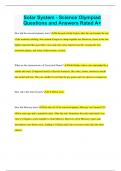
-
Solar System - Science Olympiad Questions and Answers Rated A+
- Exam (elaborations) • 31 pages • 2024
- Available in package deal
-
- $10.49
- + learn more
Solar System - Science Olympiad Questions and Answers Rated A+ How did the terrestrial planets form? In the proto-Solar-Sytem, after the sun formed, the rest of the materials orbiting close around it began to clump together too. However, closer to the sun, lighter materials like gases blew away and only rocky material was left, causing the four terrestrial planets, and some of their moons, to form. What are the characteristics of Terrestrial Planets? Solid bodies with a core surrounded...
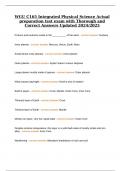
-
WGU C165 Integrated Physical Science Actual preparation test exam with Thorough and Correct Answers Updated 2024/2025
- Exam (elaborations) • 25 pages • 2024
- Available in package deal
-
- $12.49
- + learn more
WGU C165 Integrated Physical Science Actual preparation test exam with Thorough and Correct Answers Updated 2024/2025 Protons and neutrons reside in the __________ of the atom - correct answer Nucleus Inner planets - correct answer Mercury, Venus, Earth, Mars Small dense rocky planets - correct answer Inner planets Outer planets - correct answer Jupiter Saturn Uranus Neptune Large planets mostly made of gasses - correct answer Outer planets What causes day/night - correct answe...
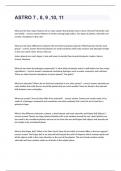
-
ASTRO 7 , 8, 9 ,10, 11 questions with answers 2024
- Exam (elaborations) • 7 pages • 2024
-
- $12.99
- + learn more
ASTRO 7 , 8, 9 ,10, 11What are the four major features of our solar system that provide clues to how it formed? Describe each one briefly. - correct answer Patterns of motion among large bodies, Two types of planets, asteroids and comets, exceptions to the rules. What are the basic differences between the terrestrial and jovian planets? Which planets fall into each group? - correct answer Terrestrial planets are small and dense with rocky surfaces and abundant metals in the core: Earth, Mars,...
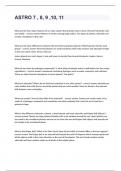
-
ASTRO 7 , 8, 9 ,10, 11 questions n answers graded A+ 2024
- Exam (elaborations) • 7 pages • 2024
- Available in package deal
-
- $12.99
- + learn more
ASTRO 7 , 8, 9 ,10, 11What are the four major features of our solar system that provide clues to how it formed? Describe each one briefly. - correct answer Patterns of motion among large bodies, Two types of planets, asteroids and comets, exceptions to the rules. What are the basic differences between the terrestrial and jovian planets? Which planets fall into each group? - correct answer Terrestrial planets are small and dense with rocky surfaces and abundant metals in the core: Earth, Mars,...
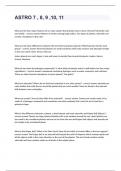
-
ASTRO 7 , 8, 9 ,10, 11 Question and answers 2024 verified to pass
- Exam (elaborations) • 7 pages • 2024
- Available in package deal
-
- $12.99
- + learn more
ASTRO 7 , 8, 9 ,10, 11 Question and answers 2024 verified to passASTRO 7 , 8, 9 ,10, 11 What are the four major features of our solar system that provide clues to how it formed? Describe each one briefly. - correct answer Patterns of motion among large bodies, Two types of planets, asteroids and comets, exceptions to the rules. What are the basic differences between the terrestrial and jovian planets? Which planets fall into each group? - correct answer Terrestrial planets are small and ...
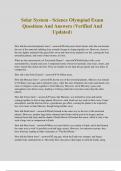
-
Solar System - Science Olympiad Exam Questions And Answers (Verified And Updated)
- Exam (elaborations) • 13 pages • 2024
- Available in package deal
-
- $12.49
- + learn more
Solar System - Science Olympiad Exam Questions And Answers (Verified And Updated) How did the terrestrial planets form? - answerIn the proto-Solar-Sytem, after the sun formed, the rest of the materials orbiting close around it began to clump together too. However, closer to the sun, lighter materials like gases blew away and only rocky material was left, causing the four terrestrial planets, and some of their moons, to form. What are the characteristics of Terrestrial Planets? - answerSol...
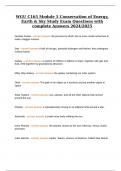
-
WGU C165 Module 5 Conservation of Energy, Earth & Sky Study Exam Questions with complete Answers 2024/2025
- Exam (elaborations) • 13 pages • 2024
- Available in package deal
-
- $11.49
- + learn more
WGU C165 Module 5 Conservation of Energy, Earth & Sky Study Exam Questions with complete Answers 2024/2025 Nuclear Fusion - correct answer the process by which two or more small nuclei fuse to make a bigger nucleus Star - correct answer A ball of hot gas, primarily hydrogen and helium, that undergoes nuclear fusion. Galaxy - correct answer a system of millions or billions of stars, together with gas and dust, held together by gravitational attraction. Milky Way Galaxy - correct answe...
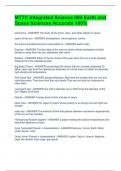
-
MTTC Integrated Science 094 Earth and Space Sciences Accurate 100%
- Exam (elaborations) • 7 pages • 2024
- Available in package deal
-
- $10.99
- + learn more
astronomy - ANSWER The study of the moon, stars, and other objects in space layers of the sun - ANSWER photosphere, chromosphere, corona the moons gravitational pull is responsible for - ANSWER earths tides Equinox - ANSWER The two days of the year on which neither hemisphere is tilted toward or away from the sun; september and march Solstice - ANSWER Either of the two times of the year when the sun is at its greatest distance from the celestial equator Big Bang Theory - ANSWER (c...
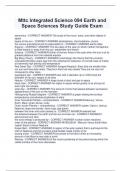
-
Mttc Integrated Science 094 Earth and Space Sciences Study Guide Exam
- Exam (elaborations) • 5 pages • 2024
- Available in package deal
-
- $12.49
- + learn more
Mttc Integrated Science 094 Earth and Space Sciences Study Guide Exam astronomy - CORRECT ANSWER-The study of the moon, stars, and other objects in space layers of the sun - CORRECT ANSWER-photosphere, chromosphere, corona the moons gravitational pull is responsible for - CORRECT ANSWER-earths tides Equinox - CORRECT ANSWER-The two days of the year on which neither hemisphere is tilted toward or away from the sun; september and march Solstice - CORRECT ANSWER-Either of the two times o...
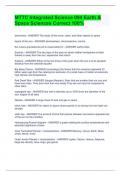
-
MTTC Integrated Science 094 Earth & Space Sciences Correct 100%
- Exam (elaborations) • 7 pages • 2024
- Available in package deal
-
- $10.99
- + learn more
astronomy - ANSWER The study of the moon, stars, and other objects in space layers of the sun - ANSWER photosphere, chromosphere, corona the moons gravitational pull is responsible for - ANSWER earths tides Equinox - ANSWER The two days of the year on which neither hemisphere is tilted toward or away from the sun; september and march Solstice - ANSWER Either of the two times of the year when the sun is at its greatest distance from the celestial equator Big Bang Theory - ANSWER (c...

How did he do that? By selling his study resources on Stuvia. Try it yourself! Discover all about earning on Stuvia


